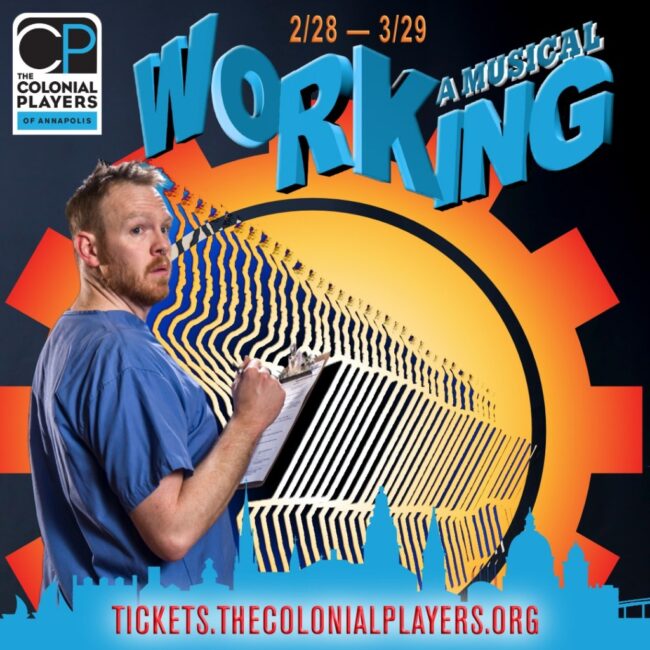Everybody should have something to point to, something to be proud of, something that says “I was there. I did that. I accomplished that.” And at the end of March 2025, ten actors, four musicians, and a whole crew of theatre tech & production crew will be able to point at a poster, archived in a frame on a wall somewhere and say, “I did that. I was there. I accomplished that. I’m proud of that.” Working: A Musical (from the book by Studs Terkel, adapted by Nina Faso & Steven Schwartz, with localized formatting conceived by Daniel C. Levine for Act of CT) is that thing that they will all be able to point to, will all be beaming from ear to ear, with bittersweet tears that it’s come to a close, that they will all know they were a part of, that they will all be proud of for having been a part of it. Directed by Tom Wyatt, this heartfelt, evocative, and strikingly relevant song-cycle style musical is a powerful experience, capturing a thread of commonality that is shared by all humanity: work. With nine of the areas finest musical theatre voices lending their talents to the score, this is a musical theatre experience like no other. You will find moments of joy and laughter, you will find moments of sorrow and tears, you’ll feel all the things— you’ll feel everything and you’ll takeaway your own personal connection to the working experience, regardless of who you are at the end of the day.

If you’ve ever been to The Colonial Players, ‘theatre-in-the-arena’ (or ‘in-the-rectangle’) will come as no surprise to you. And you can marvel at how well Director Tom Wyatt handles entrances, exits, blocking, and choreography. If you’ve never been to The Colonial Players for that unique staging and seating configuration, you can marvel at how well Director Tom Wyatt achieves all of those aforementioned components of a successful musical theatre endeavor but with first-timer’s astonishment. Serving as the show’s Director, Choreographer (blockyography) and Musical Director, Wyatt certainly pulls out all the stops and the production is a brilliant experience right from that opening number, “All the Livelong Day” through to the finale, “Something To Point To.”
What is, perhaps, less noticeable because of its deceptive simplicity, is Edd Miller’s set design. You get white-gray as the color scheme, which is not entirely inappropriate as so many working Americans deem work to be drudgery, monotony, and ‘colorless.’ And you get an ordinary gear-cog painted on the floor, center stage. A few furnishings— mainly chairs— wheel their way in and out to enhance whichever workplace setting the song or scene calls for, but other than that, Miller lets the work and the performers radiate in their own excellence. There is a hidden scrim, which conveniently conceals actors who aren’t necessarily on stage but whose vocals still have to contribute to certain ensemble numbers and this feels like a clever use of one of the corner-vom entrances to the space.
Beth Terranova tackles the arduous undertaking of accurately representing the couture of the working world. And not just pencil skirts with flouncy tops or buttoned-up suits for office life. You get scrubs for the caretakers, a full-on singe-dirtied fireman’s uniform, construction style vests, toolbelts and hats, vibrant ‘not-quite-scrub-tops’ for the cleaning ladies, Terranova handles it all in a subtle and suitable fashion. She’s assisted by Wig Stylist Maria Neves, as the ten actors play a plethora of characters throughout and depend on quick wig and costume changes to present different personalities and personas in a short span of time.
Finding a way to make the space work for you rather than your production team having to work harder to make things in the space work, is a tricky and delicate balancing act, one that Lighting Designer Dianne Trickey-Rokenbrod has mastered exceptionally well. (With the assist of Jo-Anne Taylor and a crew half-a-dozen deep on lighting tech) Trickey-Rokenbrod infuses different emotional moments with different hues and degrees of light. She sets a scene— whether it’s the special effects being used to create that jumped-up atmosphere for “Brother Trucker” or more simple sun-day-glow appearances for “Joe” or the combination of projected scenery and outdoor light for “The Mason.” Much like all the design components in this production, Trickey-Rockenbrod’s light work is nuanced and professional, feels balanced and achieves what it sets out to do without excessive overuse or surplus razzle-dazzle.
What’s absolutely flawless about this production, aside from the performers themselves, is the show’s Sound Design and overall approach to audio engineering in the space. Sound Designers Richard Atha-Nicholls and Wes Bedsworth pull out all the stops when it comes to balancing the microphones (of which just a few actors have on-body mics), equalizing the sound of the live band (which features Reid Bowman on bass, Marie Harrison on piano, Jefferson Hirshman on guitar, and Jeremy Ulrich on percussion) who are cleverly tucked away someplace not-obvious and have their sound piped in so as to not overplay or overbear the on-stage singers, and the overall volume levels of things like the interview video clips (local interviews coordinated by Duncan Hood and John Purnell; videography by Adam Daniels.)

The show as a whole is essentially seamless. There are a great many moments in transition, between the musical numbers, the monologues, and the video clips of local workers talking about their professions and their lives, all of which flow together smoothly and perfectly. It’s extremely impressive for that amount of technology to be integrated into the production without so much as a hiccup. And the various individuals’ whose stories were chosen to be including in the show (again, coordinated by Duncan Hood and John Purnell) are quite striking. Personally, the most breathtaking interview was Floyd Tasker, the Colonial Players Custodian. His story, like many others, was heartwarming and truly inspiring.
Director Tom Wyatt has the perfect team on his hands, not only from the technical and creative standpoint but from the performance perspective as well. There is some choreography, though it’s simple and blends in more than it does stand out, but this lends itself to the song-cycle nature of Working and it gives you a more natural verve to the theatrical experience overall. There’s still plenty of fun to be hand when the moments that are choreographed with more structure and intention come into play, but you never feel like you’re watching “a musical that has just hit its dance break” rather like you’re watching living moments captured from real people’s lives and dancing and energetic, excited movement, just happens to be a part of those moments at times.
I wouldn’t say I’m a fan of having a cast of only ten for a musical where one of them doesn’t sing at all. However, Tom Wyatt’s decision to bring in monologue-ringer Ben Carr just feels right; it fits the playbook for this show. Carr isn’t tucked away off stage harmonizing the group numbers or doing backing vocals, he simply arrives to play a few characters, delivers these really intense monologues, and dips back into the theatrical ether, not unlike the way some of these real life job-workers appear to do their job and then disappear out of our mind’s sight. As the ball-busting executive, you immediately want to loathe Carr’s character Rex. We’ve all encountered that guy, we all want to spit on that guy, but we’re civilized human beings so we roll our eyes, sneer, and walk away. But it’s his account as Tom, the fireman that really tugs at your heartstrings. Carr is the delicate icing on this decadent musical theatre song-cycle cake and his work in those moments of monologue is extraordinary.
As for the rest of the company— Cheryl J. Campo, Kristen Cooley, Peter N. Crews, Kyle Eshom, Christian Gonzalez, Sarah Kent, Samantha McEwen Deininger, Tia Silver, Lance Teller— they are a sublimely blended unit whose vocal prowess and versatility knows no bounds. Each of these actors takes up multiple characters throughout the performance, whether it’s a solo monologue, a monologue that roars or whispers its way into a solo song, or a character who percolates in the background of someone else’s story, singing backup or merely existing as players in their story. Wyatt and The Colonial Players of Annapolis could not have handpicked a finer cast.
Cheryl J. Campo seems to be assigned to the ‘break-your-heart’ roles twice over. When you first meet her as Rose, the school teacher, you get that kind and gentle sense of nurturing from her mere stage presence, but when she breaks into “Nobody Tells Me How” it hits home and it hits hard; the brutal reality of what teaching was 40 years ago and what it looks like now and how teachers are just expected to figure it out is raw and palpable both in Campo’s facial expressions and her vocal tone as she sings. As Theresa the nanny, Campo twines her voice with Jay, an elder caregiver (Kyle Eshom) and they duet-apart through “A Very Good Day” and the song just splits your heart down the center with all of their compassion for their charges, respectively a young child and an old man, whilst their bittersweet emotions try to resolve the pains they both feel for not being with their own families because of their jobs. The show is really beautiful and there are a lot of hilarious moments but there are also some dead-serious, heartbreaking moments and Campo and Eshom performing “A Very Good Day” is definitely one of them.
Eshom, who pops up a lot as a background singer/character, and who really radiates in that moment also gets to lend his glorious voice to another emotional power-punching song, “Fathers and Sons.” (You get a brief reprieve from the emotional thunderstorm that is “Joe”, “A Very Good Day” and “Fathers and Sons” with the girl-power punch up quartet featuring four of the show’s women— “Cleanin’ Women”) That emotionally evocative number, “Fathers and Sons” almost feels like a callback to “The Mason”, a duet shared between Anthony (Peter N. Crews) and Son (Lance Teller.) Spunky, spry, and appearing to be the baby in the bunch, Lance Teller gets a lot of the quirky rolls— particularly his monologue as Charlie the Ex-Intern— but has vocal chops that are right in line with this stacked-deck of a cast of seasoned vocal veterans. Teller is whizzing and zipping both physically and vocally through “Delivery”, which is the first solo number of the show and actually sets you up for this blindsiding false-impression of what the show is going to be. The ensemble opens with “All The Livelong Day”, which is a powerful, unifying number, and then Teller delves into a vat of cotton candy with “Delivery”, making you think it’s going to be upbeat and humorous every step of the way. Spoiler Alert: It is not. Bring tissues. Real life gives you all the feels in this show, including laughter and joy but also including heartache and tears.

One of Dianne Trickey-Rokenbrod’s nifty little lighting specials comes into play during Grace (Kristen Cooley’s) number “Millwork.” There’s a spinning gear-cog gobo that hits the floor during this number and the monotonous choreography that accompanies Cooley’s sensational voice really drives home the message of this song. Cooley is as impressive a singer as she is with the delivery of her monologues and see if you can’t catch her hiding out behind the ‘big-rig-wheel’ during “Brother Trucker” as opposed to dipping in with the ‘radio backup singer girls.’
If you want to talk comedic monologues, Samantha McEwan Deininger has two of them that will leave you chuckling heartily, which is much needed to balance out all of the pathos flying at you from this theatrical experience. As Terry, the flight attendant, the audience is roaring with her recount of experiencing difficult passengers. But it’s the lead-in monologue as Delores, a waitress, just before “It’s An Art” that has the audience splitting their seams with hysterics. Deininger wholly imbodies this flighty little waitress character, internalizing the ho-hum-doldrums of her job into the most important and preciously nuanced art to be delivered; it’s hysterical. Plus you get her soaring vocals here; they’re extraordinary. And you can hear Deininger during “Cleanin’ Women” and as one of the backup radio gals during “Brother Trucker.”
Sarah Kent, playing the haughty socialite Candy, doesn’t get a song to accompany that profession and that’s probably for the best because while the audience chuckles at her airs and graces, it does drive a little thorn into your side when you think about how that type of ‘profession’ compares to the backbreaking labor of the millworker or the mason. Kent has a down-to-earth character too, Rosie, the deli owner, where she kicks off the Act I Finale, “If I Could’ve Been.” She also stands at the end of “Just a Housewife” so that the Kate character can stare at her, creating that truly striking image of a daughter looking at her mother and wondering if she’s made her proud and vice versa.
Kate, the aforementioned housewife, is played by Tia Silver, who is the only actor (aside from Peter N. Crews) to pick up four named characters in this show (though several other actors appear in multiple unnamed roles throughout the performance.) While she cheekily delivers her monologue about being in high school and making some “quick scratch” the brutal reality is that she’s portraying a 15-year-old-sex-worker and she delivers it with such confidence and sass that it doesn’t really dawn on you how horrific that situation is until the monologue is over. Mousy as the housewife, and entitled brat living in DeLuLu as Raleigh the college student, you get a great deal of versatility from Silver, particularly when she’s adding layered harmonies to the group number.
A Tree Climber and an Iron Worker. Not two professions that immediately come to mind when someone says “what do you want to be when you grow up?” Christian Gonzalez delivers them both beautifully. He’s focally featured during “Un Mejor Dia Vendra” and his monologues are sweet and simple. That’s not to say they are without depth— they are rich and full of emotions and meaning, but not so heavy as moments like “A Very Good Day.” Gonzalez brings a balance to the stage whenever he’s on it, and you’ll love the way he fiddles with his toolbelt, like a personal quirk that he brings with him to each of the characters.
Quite possibly taking the trophy and crown for ‘Most-Versatile-Player’, Peter N. Crews is a dynamite sensation in this production. As rough-n-tumble interstate trucker Frank, you get to hear him doing his thang out in his rig. When he plops himself down into that ‘big rig driver’s seat’ there’s an unassuming confidence that borders on cockiness for Crews, which jumpstarts “Brother Trucker” into this exceptionally humorous and rowdy number. It’s a scream. The mealy, diminutive persona of Eddie the publicist couldn’t be less confident. All of the physical and vocal affectations that Crews brings to the table for this character are spot-on with anyone who’s ever felt like what they do isn’t quite enough because imposter syndrome and the inmeasurability of their success keeps them feeling trapped. Crews really radiates vocally during “The Mason”, his vocal prowess on full display in this duet. But the character that rips your heart open, gives it a firm squeeze, and then shuffles off into the sunset is his Joe. A goofy, almost caricature of this doddering but still completely-there old man, talking about retirement and singing about life in the eponymous number, “Joe” quickly darkens as those little moments creep in. The “where am I? what’s going on?” moments, none of which are directly verbalized, all of which are painted so picture perfect on his face, in his body language, and carried through the current of his vocal delivery in that song.
It’s a truly remarkable production; evocative and gripping, life-altering in a way that defies description. Everyone can relate on some level to these individuals; many of us have been these individuals. It’s a theatrical experience that needs to be embraced by the heart, mind, spirit, and soul. Ten performers, three more weekends, do not miss Working: A Musical as it is truly a life-affirming, mind-changing, show.
Running Time: Approximately 2 hours and 30 minutes with one intermission
Working: A Musical plays through March 29th 2025 at The Colonial Players of Annapolis— 108 East Street in historic Annapolis, MD. For tickets call the box office at (410) 268-7373 or purchase them online.



